
Macau law is broadly based on Portuguese law, and therefore part of the civil law tradition of continental European legal systems. Portuguese law is itself highly influenced by German law. However, many other influences are present, including Chinese law, Italian law, and some narrow aspects of common law.

The Federal Supreme Court is the supreme court of Brazil, serving primarily as the country's Constitutional Court. It is the highest court of law in Brazil for constitutional issues and its rulings cannot be appealed. On cases involving exclusively non-constitutional issues, regarding federal laws, the highest court is, by rule, the Superior Court of Justice.

The law of Brazil is based on statutes and, partly and more recently, a mechanism called súmulas vinculantes. It derives mainly from the European civil law systems, particularly the Portuguese, the Napoleonic French and the German.

The Superior Electoral Court is the highest body of the Brazilian Electoral Justice, which also comprises one Regional Electoral Court in each of the 26 states and the Federal District of the country, as determined by the Article 118 of the Constitution of Brazil.

In most legal jurisdictions, a supreme court, also known as a court of last resort, apex court, and highcourt of appeal, and court of final appeal, is the highest court within the hierarchy of courts. Broadly speaking, the decisions of a supreme court are binding on all other courts in a nation and are not subject to further review by any other court. Supreme courts typically function primarily as appellate courts, hearing appeals from decisions of lower trial courts, or from intermediate-level appellate courts. A supreme court can also, in certain circumstances, act as a court of original jurisdiction.

The Supreme Court of Justice is the highest court of law in Portugal without prejudice to the jurisdiction of the Constitutional Court.

The judiciary of Portugal is a system of courts that together constitute one of the four organs of Sovereignty as defined by the Portuguese Constitution. The courts are independent from the other three Portuguese organs of Sovereignty.
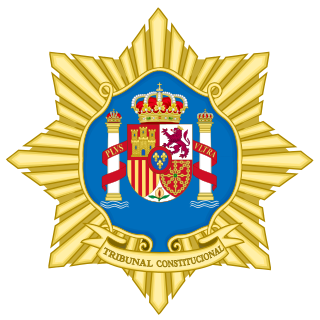
The Constitutional Court is the supreme interpreter of the Spanish Constitution, with the power to determine the constitutionality of acts and statutes made by any public body, central, regional, or local in Spain. It is defined in Part IX of the Constitution of Spain, and further governed by Organic Laws 2/1979, 8/1984, 4/1985, 6/1988, 7/1999 and 1/2000. The Court is the "supreme interpreter" of the Constitution, but since the Court is not a part of the Spanish Judiciary, the Supreme Court is the highest court for all judicial matters.

The Supreme Court is the highest court in the Kingdom of Spain. The court has original jurisdiction over cases against high-ranking officials of the Kingdom and over cases regarding the legalization of political parties. It also has ultimate appellate jurisdiction over all cases. The Court has the power of judicial review, except for the judicial revision on constitutional matters, reserved to the Constitutional Court.

The Superior Court of Justice is the highest appellate court in Brazil for non-constitutional issues regarding federal law. The STJ also has original jurisdiction over some cases. Its jurisdiction is provided for in Article 105 of the Brazilian Constitution.
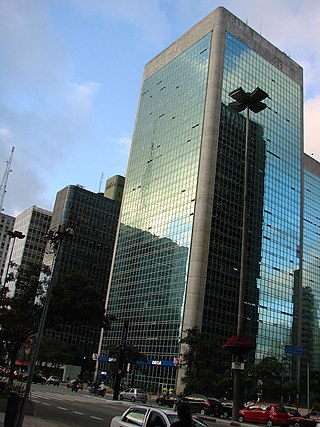
The Regional Federal Courts are the courts of appeal in the Federal Courts of Brazil, the second instance courts of the Brazilian federal justice system, responsible not only for appeals of trial court decisions, but also for writs of security, habeas corpus, and habeas data against acts by federal judges, motions to set aside judgments, criminal revisions, and conflicts of jurisdiction.

The judiciary of Malta interprets and applies the laws of Malta, to ensure equal justice under law, and to provide a mechanism for dispute resolution. The legal system of Malta is based partially on English law and partly on Continental law, whilst also being subject to European Union law.

The Supreme Court of Costa Rica is the court of greater hierarchy of Law and Justice in Costa Rica.
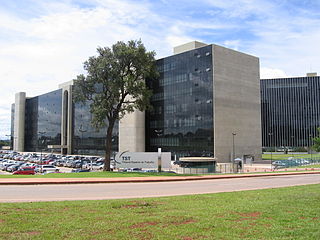
The Superior Labor Court, is the highest Brazilian appellate court for labor law issues. Its headquarters are located in Brasília, near the American Embassy.
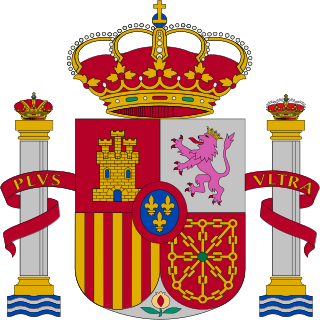
The Judiciary of Spain consists of Courts and Tribunals, composed of judges and magistrates (Justices), who have the power to administer justice in the name of the King of Spain.

The Constitution of Timor-Leste entered into force on 20 May 2002, and was the country's first constitution after it gained independence from Portugal in 1975 and from Indonesia, which invaded East Timor on 7 December 1975 and left in 1999 following a UN-sponsored referendum.

The Judiciary of Brazil is the group of public entities designated by the Brazilian constitution to carry out the country's judicial functions.
The Federal Government of Brazil is the national government of the Federative Republic of Brazil, a republic in South America divided into 26 states and a federal district. The Brazilian federal government is divided into three branches: the executive, which is headed by the President and the cabinet; the legislative, whose powers are vested by the Constitution in the National Congress; and the judiciary, whose powers are vested in nine organs, including the Supreme Federal Court and lower federal courts. The seat of the federal government is located in Brasília.

Maria Ângela Guterres Viegas Carrascalão is an East Timorese journalist, author, university teacher and former Minister of Justice. She is a member of the Timorese Democratic Union.
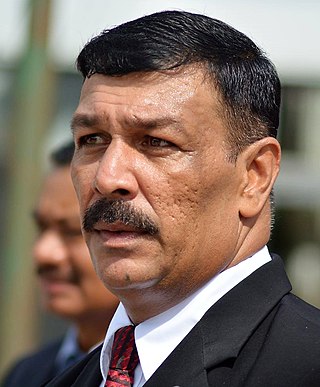
Longuinhos Rabindranatha Tagore Domingues de Castro Monteiro is an East Timorese jurist, administrator and politician. He has held several positions in government, including that of Minister of the Interior in the VI Constitutional Government between 2015 and 2017.



























